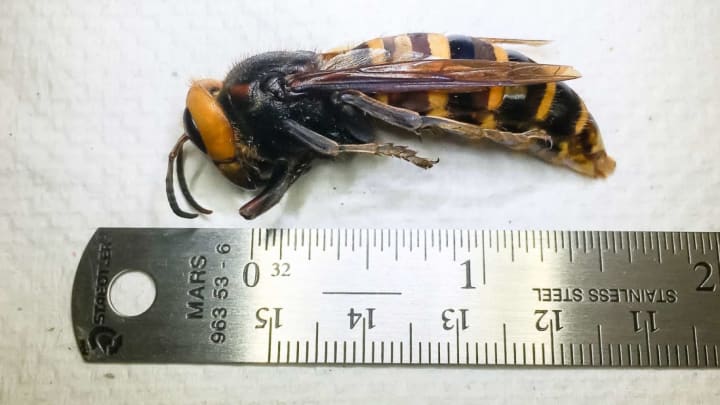In early May, a flurry of alarming headlines warned us that a new winged beast had landed in the continental U.S. It was the Asian murder hornet (Vespa mandarinia), also called the Asian giant hornet, a potentially 2-inch-long pest with a sting that one victim described to The New York Times as “red-hot thumbtacks being driven into my flesh.” At the time, a few had been spotted in Washington state, and entomologists were setting traps to catch them and track them back to their nests. Now, they’ve finally got one in their grasp.
As CBS News reports, the Washington State Department of Agriculture (WSDA) found the hornet on July 14 in a bottle trap set near Whatcom County’s Birch Bay. It’s the only trapped specimen so far; Washington’s previous five sightings were all free-roaming.
“This is encouraging because it means we know that the traps work,” Sven Spichiger, WSDA’s managing entomologist, said in a press release. “But it also means we have work to do.”

Right now, the captured hornet’s colony is likely abuzz with just one queen and some worker hornets, but that’ll change after mating season begins in mid-September. New queens and other hornets will be born, and the growing community will soon wreak havoc on the area—especially its honeybees. Murder hornets target beehives, beheading the bees and feeding the leftover thoraxes to their young.
To keep the species from decimating the state’s bee population (not to mention stinging unsuspecting humans), it’s imperative that the WSDA locate the hornets’ hives and destroy them within the next two months. The organization is currently installing more traps and infrared cameras, hoping to capture a live hornet they can tag and follow back to its home.
Beekeepers and other locals are joining the effort by setting their own traps, which you can learn how to do here. And if you think you see a murder hornet somewhere in Washington, you should report it here.
[h/t CBS News]
